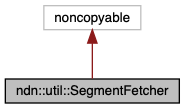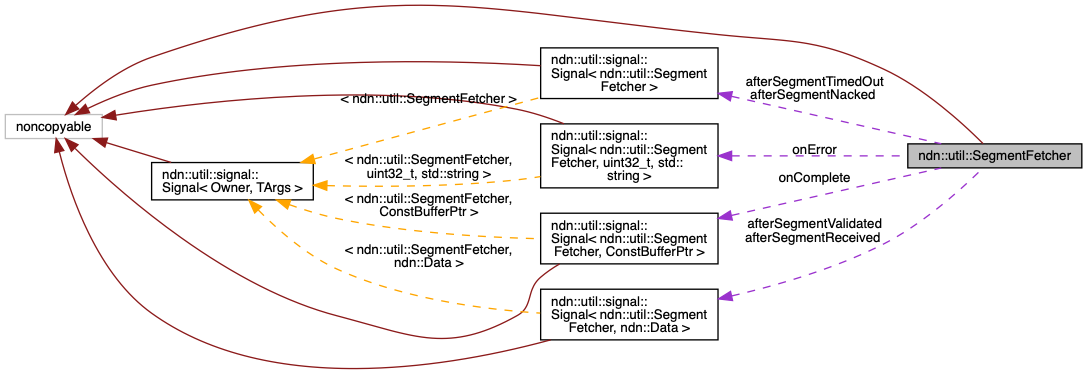Utility class to fetch the latest version of a segmented object. More...
#include <segment-fetcher.hpp>


Classes | |
| class | Options |
Public Types | |
| enum | ErrorCode { INTEREST_TIMEOUT = 1, DATA_HAS_NO_SEGMENT = 2, SEGMENT_VALIDATION_FAIL = 3, NACK_ERROR = 4, FINALBLOCKID_NOT_SEGMENT = 5 } |
| Error codes passed to onError. More... | |
Public Member Functions | |
| void | stop () |
| Stops fetching. More... | |
Static Public Member Functions | |
| static shared_ptr< SegmentFetcher > | start (Face &face, const Interest &baseInterest, security::v2::Validator &validator, const Options &options=Options()) |
| Initiates segment fetching. More... | |
Public Attributes | |
| Signal< SegmentFetcher, ConstBufferPtr > | onComplete |
| Emits upon successful retrieval of the complete data. More... | |
| Signal< SegmentFetcher, uint32_t, std::string > | onError |
| Emits when the retrieval could not be completed due to an error. More... | |
| Signal< SegmentFetcher, Data > | afterSegmentReceived |
| Emits whenever a data segment received. More... | |
| Signal< SegmentFetcher, Data > | afterSegmentValidated |
| Emits whenever a received data segment has been successfully validated. More... | |
| Signal< SegmentFetcher > | afterSegmentNacked |
| Emits whenever an Interest for a data segment is nacked. More... | |
| Signal< SegmentFetcher > | afterSegmentTimedOut |
| Emits whenever an Interest for a data segment times out. More... | |
Utility class to fetch the latest version of a segmented object.
SegmentFetcher assumes that segments in the object are named /<prefix>/<version>/<segment>, where:
<prefix> is the specified prefix,<version> is an unknown version that needs to be discovered, and<segment> is a segment number (the number of segments in the object is unknown until a Data packet containing the FinalBlockId field is received).SegmentFetcher implements the following logic:
Express an Interest to discover the latest version of the object:
Interest: /<prefix>?ndn.CanBePrefix=true&ndn.MustBeFresh=true
<version> = Data.getName().get(-2)Keep sending Interests for future segments until an error occurs or the number of segments indicated by the FinalBlockId in a received Data packet is reached. This retrieval will start at segment 1 if segment 0 was received in response to the Interest expressed in step 2; otherwise, retrieval will start at segment 0. By default, congestion control will be used to manage the Interest window size. Interests expressed in this step will follow this Name format:
Interest: /<prefix>/<version>/<segment=(N)>
If an error occurs during the fetching process, onError is signaled with one of the error codes from SegmentFetcher::ErrorCode.
A Validator instance must be specified to validate individual segments. Every time a segment has been successfully validated, afterSegmentValidated will be signaled.
Example:
Definition at line 97 of file segment-fetcher.hpp.
Error codes passed to onError.
| Enumerator | |
|---|---|
| INTEREST_TIMEOUT | Retrieval timed out because the maximum timeout between the successful receipt of segments was exceeded. |
| DATA_HAS_NO_SEGMENT | One of the retrieved Data packets lacked a segment number in the last Name component (excl. implicit digest) |
| SEGMENT_VALIDATION_FAIL | One of the retrieved segments failed user-provided validation. |
| NACK_ERROR | An unrecoverable Nack was received during retrieval. |
| FINALBLOCKID_NOT_SEGMENT | A received FinalBlockId did not contain a segment component. |
Definition at line 103 of file segment-fetcher.hpp.
|
static |
Initiates segment fetching.
Transfer completion, failure, and progress are indicated via signals.
| face | Reference to the Face that should be used to fetch data. |
| baseInterest | Interest for the initial segment of requested data. This interest may include a custom InterestLifetime and parameters that will propagate to all subsequent Interests. The only exception is that the initial Interest will be forced to include the "CanBePrefix=true" and "MustBeFresh=true" parameters, which will not be included in subsequent Interests. |
| validator | Reference to the Validator the fetcher will use to validate data. The caller must ensure the validator remains valid until either onComplete or onError has been signaled. |
| options | Options controlling the transfer. |
Definition at line 89 of file segment-fetcher.cpp.
| void ndn::util::SegmentFetcher::stop | ( | ) |
Stops fetching.
This cancels all interests that are still pending.
Definition at line 101 of file segment-fetcher.cpp.
References ndn::util::scheduler::Scheduler::cancelEvent(), ndn::Face::removePendingInterest(), and ndn::util::scheduler::Scheduler::scheduleEvent().
| Signal<SegmentFetcher, ConstBufferPtr> ndn::util::SegmentFetcher::onComplete |
Emits upon successful retrieval of the complete data.
Definition at line 246 of file segment-fetcher.hpp.
| Signal<SegmentFetcher, uint32_t, std::string> ndn::util::SegmentFetcher::onError |
Emits when the retrieval could not be completed due to an error.
Handlers are provided with an error code and a string error message.
Definition at line 253 of file segment-fetcher.hpp.
| Signal<SegmentFetcher, Data> ndn::util::SegmentFetcher::afterSegmentReceived |
Emits whenever a data segment received.
Definition at line 258 of file segment-fetcher.hpp.
| Signal<SegmentFetcher, Data> ndn::util::SegmentFetcher::afterSegmentValidated |
Emits whenever a received data segment has been successfully validated.
Definition at line 263 of file segment-fetcher.hpp.
| Signal<SegmentFetcher> ndn::util::SegmentFetcher::afterSegmentNacked |
Emits whenever an Interest for a data segment is nacked.
Definition at line 268 of file segment-fetcher.hpp.
| Signal<SegmentFetcher> ndn::util::SegmentFetcher::afterSegmentTimedOut |
Emits whenever an Interest for a data segment times out.
Definition at line 273 of file segment-fetcher.hpp.